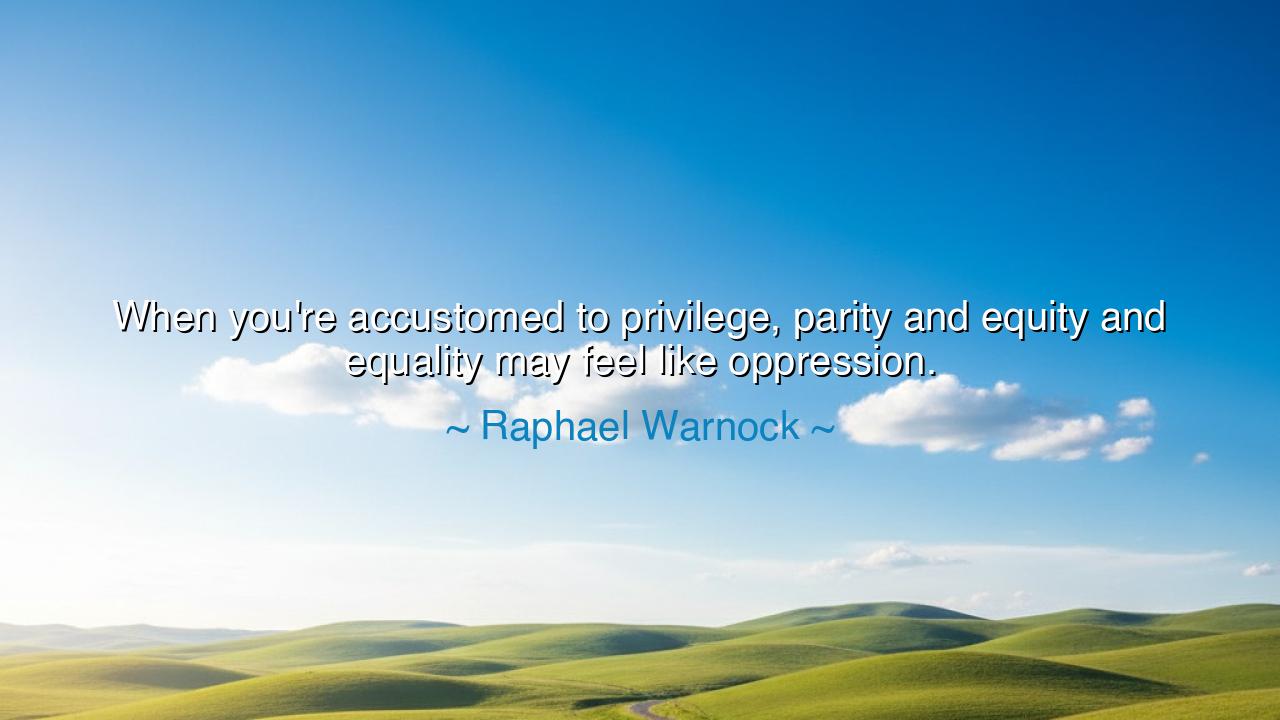
When you're accustomed to privilege, parity and equity and
When you're accustomed to privilege, parity and equity and equality may feel like oppression.






“When you’re accustomed to privilege, parity and equity and equality may feel like oppression.” These words of Raphael Warnock, the American pastor and statesman, speak with the moral clarity of the prophets and the precision of truth sharpened by struggle. Beneath their calm rhythm burns the fire of justice — a reminder that comfort can blind the conscience, and that those who have long stood upon the higher ground of advantage may see fairness itself as a fall. Warnock’s insight is both psychological and moral: that when one’s life has been built upon unacknowledged privilege, even the leveling of the field can feel like loss.
In these words, Warnock lays bare the human heart — how it clings to habit, even when habit is unjust. Privilege is not always chosen, yet it is fiercely defended. It can disguise itself as normalcy, convincing those who possess it that their ease is the natural order of things. Thus, when equality begins to dawn, when the scales tilt toward justice, the privileged cry out — not because they are being harmed, but because they are being awakened. The light that reveals injustice can seem cruel to eyes long accustomed to shadow. This, Warnock reminds us, is the source of much resistance to progress: that justice feels like oppression to those who mistake advantage for right.
History has given countless examples of this truth. When the abolition of slavery spread through the world, many who had profited from the suffering of others saw freedom as a threat, not a triumph. The American South trembled not because it lost its dignity, but because it lost its domination. A century later, during the Civil Rights Movement, men and women who had long enjoyed unchallenged supremacy complained that equality was “moving too fast.” They mistook the expansion of freedom for the shrinking of their own. Yet in reality, nothing was taken from them but their privilege to stand above others. Warnock’s words are an echo of that lesson — that liberation for one group is not oppression for another, but the restoration of balance in the human order.
The ancients, too, understood this tension. In the dialogues of Plato, the philosopher warned that those who live in the cave mistake the sunlight for pain. When a prisoner is freed and led into the brightness, his first instinct is to resist, to curse the light that wounds his eyes. But in time, he learns that what seemed punishment was in fact revelation. So it is with those who awaken from privilege: they must learn to endure the discomfort of awareness before they can see the truth of equality. In every age, justice must tear away illusion before it can plant harmony — and those who benefit from illusion will always cry out in fear.
Warnock’s message, though rooted in the modern world, belongs to the eternal moral tradition — the call of the conscience to humility. He does not speak only to the powerful, but to all who hold advantage in any form: the wealthy, the educated, the secure, the favored. His wisdom is this: privilege is invisible to those who have it, until the world changes enough to reveal it. To feel threatened by that revelation is natural; to remain hardened by it is destructive. The noble heart learns to transform discomfort into empathy — to see equality not as loss, but as liberation for all.
Consider the story of Nelson Mandela, who, after decades of imprisonment, rose not in vengeance but in vision. When apartheid fell, many in South Africa’s white minority feared equality as if it were ruin. But Mandela, standing like a prophet among them, declared that freedom was not a weapon but a bridge. “I am not truly free,” he said, “if I am taking away someone else’s freedom.” Through his patience and wisdom, he transformed a nation’s fear into hope. In this way, he embodied Warnock’s teaching: that those accustomed to dominance must learn that justice does not destroy — it restores.
So, my children, remember this: when fairness feels like loss, examine what you have been clinging to. Let discomfort become your teacher, not your enemy. Do not fear equality; fear instead the blindness that keeps you from seeing it as good. For the world cannot move forward while






AAdministratorAdministrator
Welcome, honored guests. Please leave a comment, we will respond soon